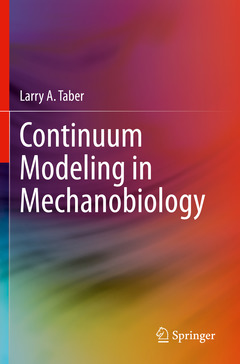Continuum Modeling in Mechanobiology, 1st ed. 2020
Auteur : Taber Larry A.

Larry Taber is a Senior Professor of Biomedical Engineering at Washington University in St. Louis. From 2007 until his retirement in 2017, he was the Dennis and Barbara Kessler Professor of Biomedical Engineering. Although his formal training is in aerospace engineering (B.A.E., Georgia Tech; Ph.D., Stanford University), he has published on a wide range of topics including cochlear mechanics, nonlinear shell theory, cardiovascular mechanics, and the mechanics of growth and development. Dr. Taber is a fellow of the American Society of Mechanical Engineers (ASME) and the American Institute for Medical and Biological Engineering. Three times he won the Richard Skalak Award for the best paper published in the Journal of Biomechanical Engineering, and in 2020 was awarded the H.R. LIssner Medal from ASME. From 2011-2016, he served as co-editor-in-chief of the journal Biomechanics and Modeling in Mechanobiology.
Broadens readers’ understanding of nonlinear elasticity, contractility, growth and remodeling theory, and mechanical feedback in development
Includes numerous quantitative examples to illustrate basic theoretical mechanobiology concepts, such as active force generation, theories for growth and remodeling, and morphogenesis
Illustrates theories with numerous applications to specific problems, such as cardiac mechanics, growth (and remodeling) of the heart and arteries, and embryonic development of the heart, brain, and gut
Date de parution : 06-2021
Ouvrage de 535 p.
15.5x23.5 cm
Date de parution : 06-2020
Ouvrage de 535 p.
15.5x23.5 cm



